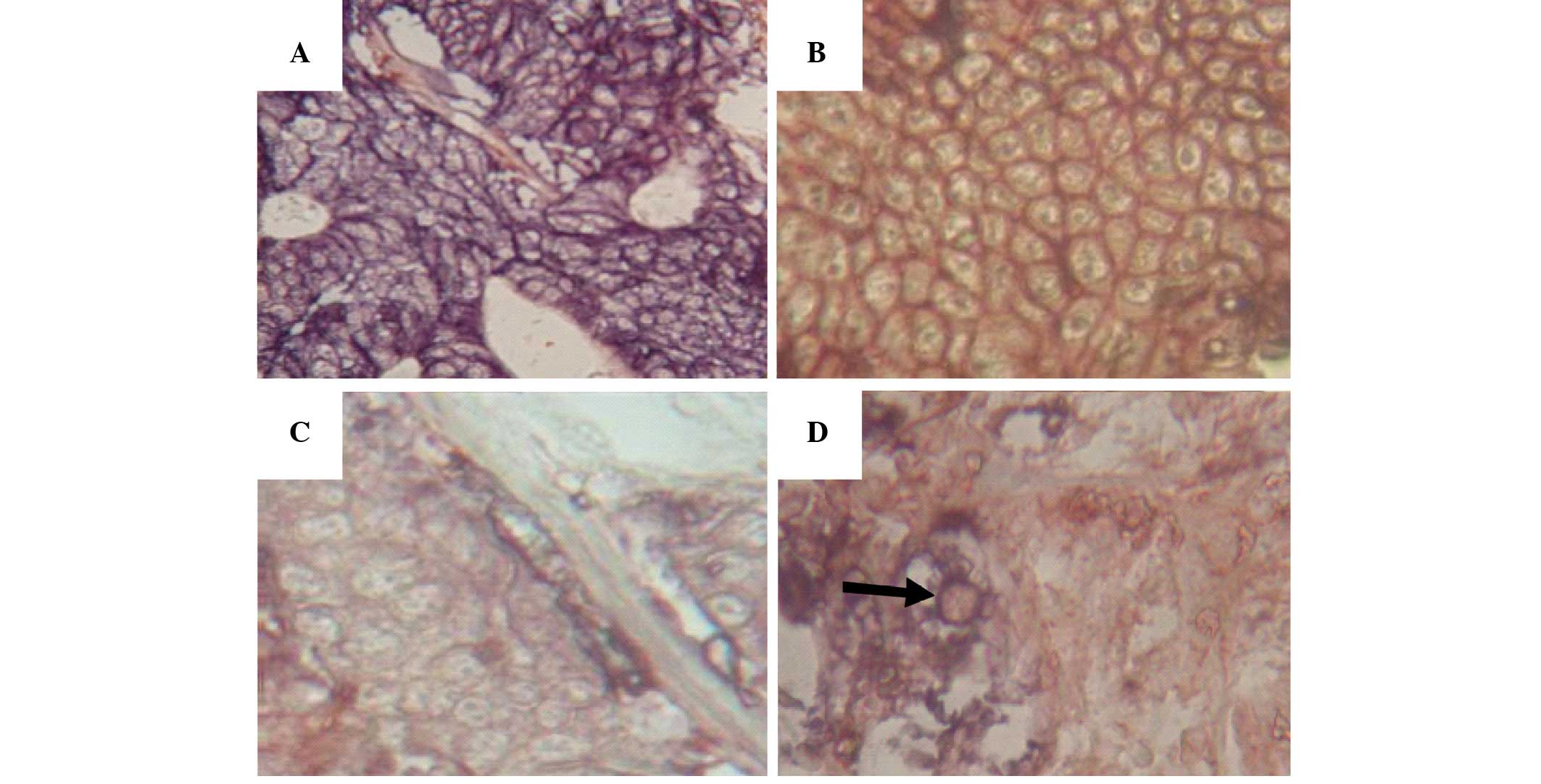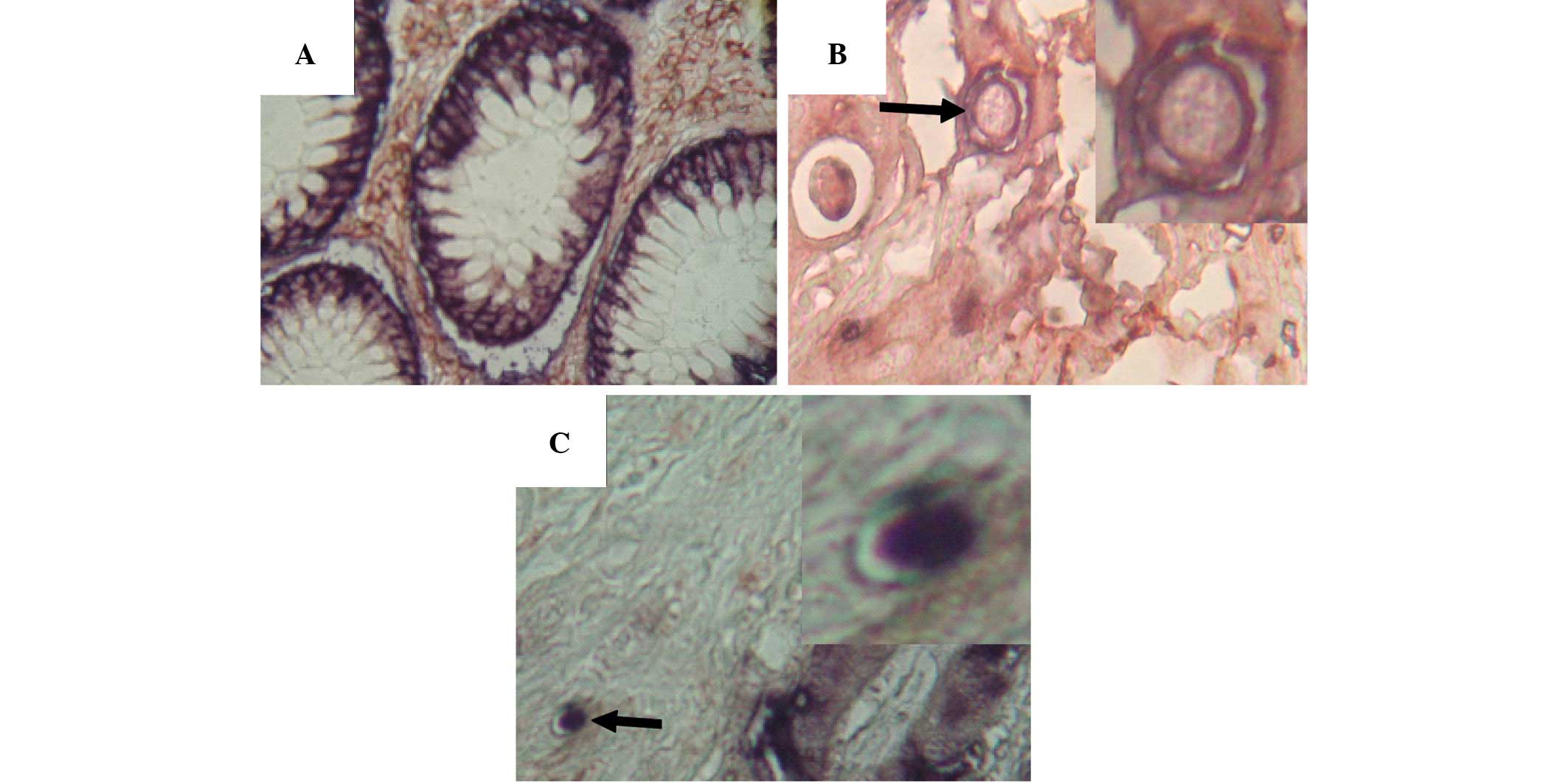|
1
|
Yamaki M, Shinozaki K, Sakaguchi T, Meseck
M, Ebert O, Ohdan H and Woo SL: The potential of recombinant
vesicular stomatitis virus-mediated virotherapy against metastatic
colon cancer. Int J Mol Med. 31:299–306. 2013.
|
|
2
|
Christ B and Stock P: Mesenchymal stem
cell-derived hepatocytes for functional liver replacement. Front
Immunol. 3:1682012. View Article : Google Scholar : PubMed/NCBI
|
|
3
|
Lakowski J, Han YT, Pearson RA, et al:
Effective transplantation of photoreceptor precursor cells selected
via cell surface antigen expression. Stem Cells. 29:1391–1404.
2011.
|
|
4
|
Dalerba P, Dylla SJ, Park IK, et al:
Phenotypic characterization of human colorectal cancer stem cells.
Proc Natl Acad Sci USA. 104:10158–10163. 2007. View Article : Google Scholar : PubMed/NCBI
|
|
5
|
Lugli A, Iezzi G, Hostettler I, et al:
Prognostic impact of the expression of putative cancer stem cell
markers CD133, CD166, CD44s, EpCAM, and ALDH1 in colorectal cancer.
Br J Cancer. 103:382–390. 2010. View Article : Google Scholar : PubMed/NCBI
|
|
6
|
Piscuoglio S, Lehmann FS, Zlobec I, et al:
Effect of EpCAM, CD44, CD133 and CD166 expression on patient
survival in tumours of the ampulla of Vater. J Clin Pathol.
65:140–145. 2012. View Article : Google Scholar : PubMed/NCBI
|
|
7
|
Fléjou JF: WHO Classification of digestive
tumors: the fourth edition. Ann Pathol. 31:S27–S31. 2011.(In
French).
|
|
8
|
Aust DE: WHO classification 2010 for the
lower gastrointestinal tract: what is new? Pathologe. 32:326–331.
2011.(In German).
|
|
9
|
Lin Y, Zhong Y, Guan H, Zhang X and Sun Q:
CD44+/CD24− phenotype contributes to
malignant relapse following surgical resection and chemotherapy in
patients with invasive ductal carcinoma. J Exp Clin Cancer Res.
31:592012.
|
|
10
|
Haraguchi N, Inoue H, Tanaka F, et al:
Cancer stem cells in human gastrointestinal cancers. Hum Cell.
19:24–29. 2006. View Article : Google Scholar
|
|
11
|
Sankpal NV, Mayfield JD, Willman MW,
Fleming TP and Gillanders WE: Activator protein 1 (AP-1)
contributes to EpCAM-dependent breast cancer invasion. Breast
Cancer Res. 13:R1242011. View
Article : Google Scholar : PubMed/NCBI
|
|
12
|
Lin CW, Liao MY, Lin WW, Wang YP, Lu TY
and Wu HC: Epithelial cell adhesion molecule regulates tumor
initiation and tumorigenesis via activating reprogramming factors
and epithelial-mesenchymal transition gene expression in colon
cancer. J Biol Chem. 287:39449–39459. 2012. View Article : Google Scholar
|
|
13
|
Gaiser MR, Lämmermann T, Feng X, et al:
Cancer-associated epithelial cell adhesion molecule (EpCAM; CD326)
enables epidermal Langerhans cell motility and migration in
vivo. Proc Natl Acad Sci USA. 109:E889–E897. 2012. View Article : Google Scholar
|
|
14
|
Jaggupilli A and Elkord E: Significance of
CD44 and CD24 as cancer stem cell markers: an enduring ambiguity.
Clin Dev Immunol. 2012:7080362012. View Article : Google Scholar : PubMed/NCBI
|
|
15
|
Murai T, Maruyama Y, Mio K, Nishiyama H,
Suga M and Sato C: Low cholesterol triggers membrane
microdomain-dependent CD44 shedding and suppresses tumor cell
migration. J Biol Chem. 286:1999–2007. 2011. View Article : Google Scholar : PubMed/NCBI
|
|
16
|
Zarrabi K, Dufour A, Li J, et al:
Inhibition of matrix metalloproteinase 14 (MMP-14)-mediated cancer
cell migration. J Biol Chem. 286:33167–33177. 2011. View Article : Google Scholar : PubMed/NCBI
|
|
17
|
Kemper K, Grandela C and Medema JP:
Molecular identification and targeting of colorectal cancer stem
cells. Oncotarget. 1:387–395. 2010.PubMed/NCBI
|
|
18
|
Schulenburg A, Cech P, Herbacek I, Marian
B, Wrba F, Valent P and Ulrich-Pur H: CD44-positive colorectal
adenoma cells express the potential stem cell markers musashi
antigen (msi1) and ephrin B2 receptor (EphB2). J Pathol.
213:152–160. 2007. View Article : Google Scholar
|
|
19
|
Strauss R, Li ZY, Liu Y, et al: Analysis
of epithelial and mesenchymal markers in ovarian cancer reveals
phenotypic heterogeneity and plasticity. PLoS One. 6:e161862011.
View Article : Google Scholar : PubMed/NCBI
|
|
20
|
Belov L, Zhou J and Christopherson RI:
Cell surface markers in colorectal cancer prognosis. Int J Mol Sci.
12:78–113. 2010. View Article : Google Scholar : PubMed/NCBI
|
|
21
|
Wang SJ and Bourguignon LY: Role of
hyaluronan-mediated CD44 signaling in head and neck squamous cell
carcinoma progression and chemoresistance. Am J Pathol.
178:956–963. 2011. View Article : Google Scholar : PubMed/NCBI
|
|
22
|
Kuhn S, Koch M, Nübel T, et al: A complex
of EpCAM, claudin-7, CD44 variant isoforms, and tetraspanins
promotes colorectal cancer progression. Mol Cancer Res. 5:553–567.
2007. View Article : Google Scholar : PubMed/NCBI
|
|
23
|
Marhaba R, Klingbeil P, Nuebel T,
Nazarenko I, Buechler MW and Zoeller M: CD44 and EpCAM:
cancer-initiating cell markers. Curr Mol Med. 8:784–804. 2008.
View Article : Google Scholar : PubMed/NCBI
|
|
24
|
Dylla SJ, Beviglia L, Park IK, et al:
Colorectal cancer stem cells are enriched in xenogeneic tumors
following chemotherapy. PLoS One. 3:e24282008. View Article : Google Scholar : PubMed/NCBI
|
|
25
|
Biddle A, Liang X, Gammon L, Fazil B,
Harper LJ, Emich H, Costea DE and Mackenzie IC: Cancer stem cells
in squamous cell carcinoma switch between two distinct phenotypes
that are preferentially migratory or proliferative. Cancer Res.
71:5317–5326. 2011. View Article : Google Scholar
|
|
26
|
Münz M, Murr A, Kvesic M, et al:
Side-by-side analysis of five clinically tested anti-EpCAM
monoclonal antibodies. Cancer Cell Int. 10:442010.PubMed/NCBI
|
|
27
|
Bezan A, Hohla F, Meissnitzer T, et al:
Systemic effect of catumaxomab in a patient with metastasized
colorectal cancer: a case report. BMC Cancer. 13:6182013.
View Article : Google Scholar : PubMed/NCBI
|
















